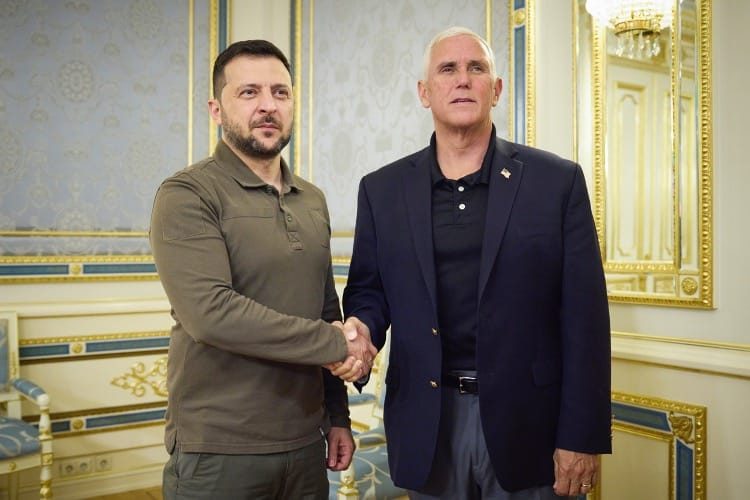
Former Vice President Mike Pence took a swipe at his chief rivals for the 2024 Republican presidential nomination Wednesday, saying former President Donald Trump and Florida Governor Ron DeSantis “don’t understand” the importance of ongoing U.S. military aid to Ukraine.
“With all due respect, I think the former president and the governor of Florida just don’t understand Americans’ national interest in supporting the Ukrainian military in repelling the Russian military in Ukraine,” Pence told the Associated Press.
Pence, of course, does.
“Make no mistake,” he said. “China is watching.”
According to the AP, “Pence, who has called for robust aid to the Ukrainian military, said the United States’ commitment to keeping Russia in check signals its willingness to also hold China’s military ambitions in check in Asia.”
Both Trump and DeSantis have suggested more hands-off approaches to the Russia-Ukraine conflict.
In response to a March questionnaire from Tucker Carlson, Trump said that while opposing the Russian invasion was not in America’s national interest, it was very much in Europe’s interest. “Start by telling Europe that they must pay at least equal to what the U.S. is paying to help Ukraine…. Next, tell Ukraine that there will be little more money coming from us, UNLESS RUSSIA CONTINUES TO PROSECUTE THE WAR.”
DeSantis told Carlson that “while the U.S. has many vital national interests … becoming further entangled in a territorial dispute between Ukraine and Russia is not one of them.”
The two leading contenders for the GOP nomination appear to be more in tune with voters, especially Republicans, than Pence. Recent polls have found that few Americans believe the United States should play a major role in the Ukraine war and that a majority of Republican primary voters are less likely to support a candidate who favors additional Ukraine aid.
Nevertheless, reported National Review:
Supporting Ukraine’s war effort had been a core tenet of Pence’s messaging even before he announced his presidential bid. “It’s not a territorial dispute. It’s not an argument over borders and nations. It’s a Russian invasion. And it’s simply Vladimir Putin’s latest effort to redraw international lines by force,” he said, speaking at the National Review Ideas Summit in March.
Indeed, Pence is so invested in Ukraine intervention that last week he made his second surprise visit to the country since the war began; the first, a brief crossing of the Poland-Ukraine border to deliver humanitarian aid, took place in March 2022.
“I’m here because it’s important that the American people understand the progress that we’ve made and how support for the Ukrainian military has been in our national interest,” he told NBC News, which traveled with him to Ukraine last Thursday.
Pence has been an outspoken critic of opponents of Ukraine aid. “Where would Russian tanks be today if NATO had not expanded the borders of freedom?” he said in March. “There is no room in this party for apologists for Putin.”
The reality is that Russian tanks might still be within Russia’s borders if not for NATO’s continual eastward expansion since the end of the Cold War — something Washington promised Moscow would not happen. With adversarial forces coming ever closer to its borders, the increasingly cornered Bear went on offense, claiming Crimea and now attempting to annex part of Ukraine.
Moreover, Kyiv has waged a civil war against the Russian-speaking Donbass region, which wants its independence, since 2014. That year, the democratically elected president, Victor Yanukovych, who was friendly to Russia, was ousted in a coup in which the U.S. government was heavily involved. To Donbass residents, Russia’s incursion might appear to be liberation rather than invasion, while NATO might seem to be part of the problem.
Then there’s the fact that Washington’s Ukraine policy has actually pushed Russia and China closer together, making it less likely that either one will fear the United States.
None of this, it seems, can shake Pence’s resolve to continue backing Ukraine at taxpayer expense.
“If we don’t stand apart, if we don’t give the Ukrainian military what they need to defeat and repel the Russian invasion, I’m convinced that the second half of the 21st century will look a great deal more like the first half of the 20th century,” he told the AP.
But the first half of the 20th century was so bloody in large part because of the United States’ meddling in foreign wars. U.S. entry into World War I, a conflict between European imperial powers, ensured that instead of a stalemate and subsequent negotiated peace, the war ended with the defeat of Germany and the Treaty of Versailles. That set the stage for Adolf Hitler’s rise to power, leading to World War II, the Cold War, the Korean and Vietnam wars, and a variety of smaller skirmishes.
If he is elected president, Pence will take an oath to “preserve, protect, and defend the Constitution,” a document that nowhere authorizes the federal government to send aid to foreign countries or to involve itself in their wars absent a declaration from Congress. The authors of that document also warned against intervention in other nations’ affairs.
Pence clearly has no intention of following either the Constitution or the Founders’ advice when it comes to Ukraine.
“I think we need to stand firm, stand strong [with Ukraine],” he told the AP. “I’m going to do that, while others may be giving way to a more populist sentiment.”




